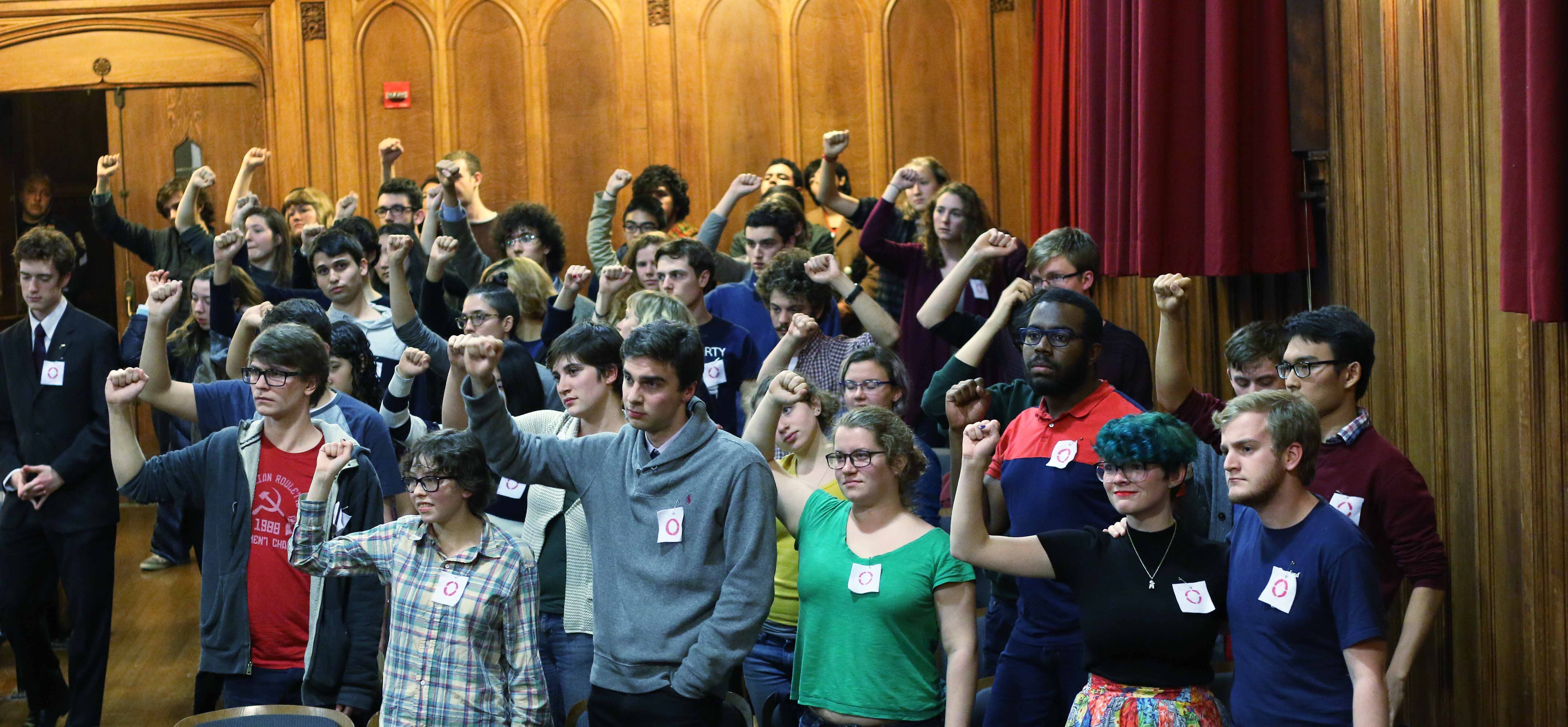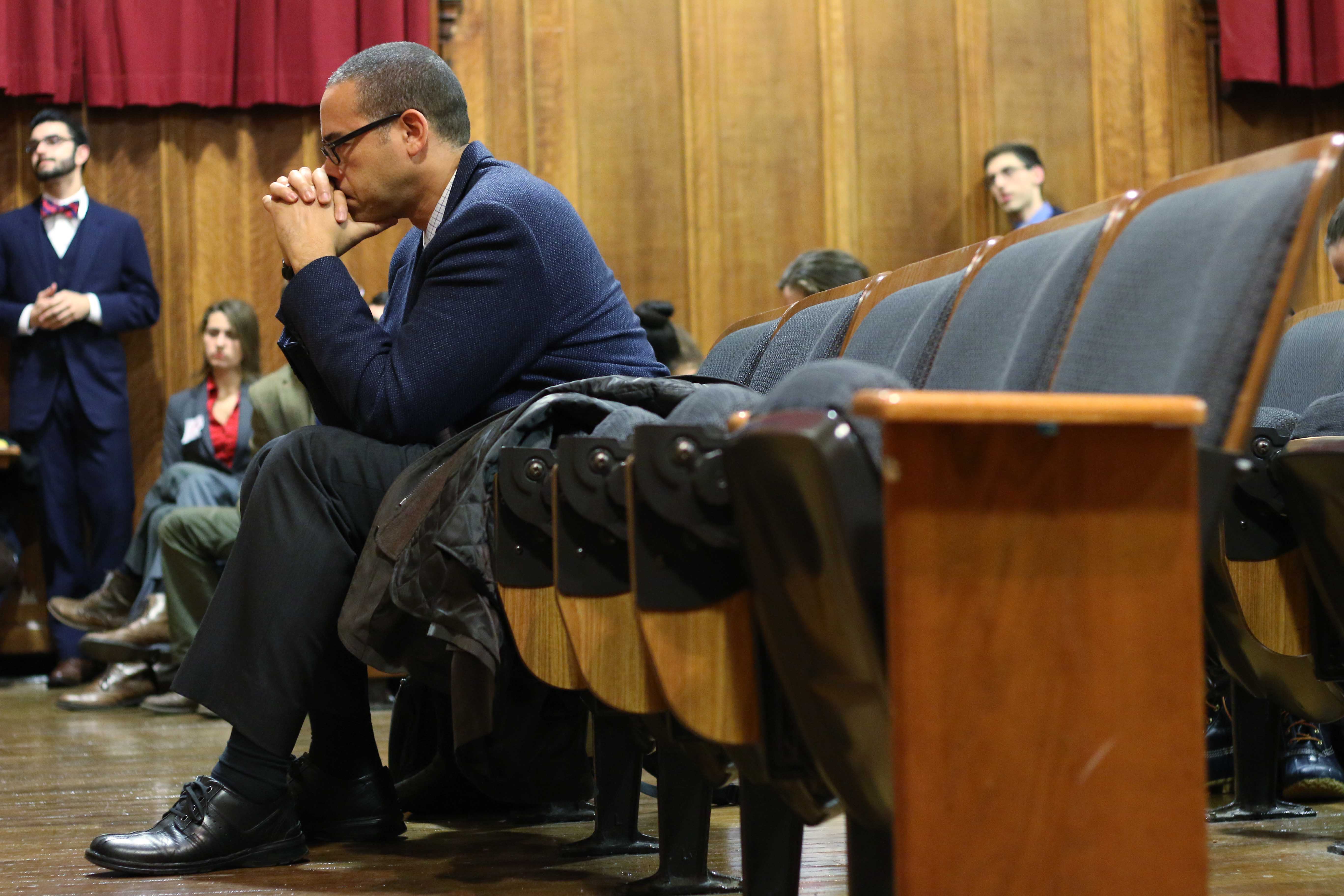
The Yale Political Union held a debate Tuesday night on the topic of affirmative action, amidst ongoing campus discussions about race and the status of students of color on campus.
Amy Wax ’75, a law professor at the University of Pennsylvania whose work addresses issues of social welfare law and policy, spoke against affirmative action on the grounds that it ultimately disadvantages the underrepresented minorities it was originally designed to help. Although YPU members and Yale administrators expected students to protest the debate, Wax’s speech proceeded uninterrupted before the crowd of roughly 200 students. The debate came several days after student activists rallied outside a free speech conference held by the William F. Buckley Jr. Program in protest of a speaker’s joke about the genocide of Native Americans.
Students said they had heard that before the debate began, Afro-American Cultural Center Director Risë Nelson had asked students to boycott the debate, rather than protest it, in order to avoid fueling criticisms that student activists are infringing upon others’ free speech.
Still, before Wax delivered her speech, Yale College Dean Jonathan Holloway spoke before the YPU, asking members to respect freedom of expression at Yale.
“By preventing anyone from bringing ideas into the light of day, we deny a fundamental freedom,” Holloway said, going on to remind students of the University’s policies regarding disruption and appropriate demonstration at University-sponsored events like YPU debates. Five Yale police officers stood at the back of the hall for the duration of the event.
The chairs of two of the YPU’s left-leaning parties also spoke before Wax’s speech, stating that they wished the debate had been postponed out of sensitivity to students who felt shaken by the past week’s protests and discussions about race. The YPU’s guest speakers for the fall semester were invited last spring; Wax was not invited in response to ongoing campus conversations about race at Yale.
Emaline Kelso ’17, the chair of the Liberal Party, spoke first, saying that the YPU governing body, by permitting the debate to proceed as planned, “refuses to be sensitive to the needs of its constituents, members and friends.”
Layla Treuhaft-Ali ’17, the chair of the Party of the Left, said her party did not approve of the way the YPU handled the debate, and it did not represent what her party wanted from the Union. Her party wishes to participate in debates that contribute to constructive campus conversations at appropriate times and not debates that are held just for the sake of debating, she said.
“This week we heard from students of color that they felt excluded from institutions and discourse at Yale,” Treuhaft-Ali told the crowd. “The Party of the Left cannot condone a Union that willfully ignores what’s happening outside its walls and prides itself on being unresponsive to its community.”
Still, Treuhaft-Ali said she had no intention of preventing Wax from speaking.

The debate proceeded as planned. During her speech, Wax cited several statistics about the academic performance of underrepresented minorities like African-Americans who are accepted to colleges and universities as part of affirmative action. She criticized affirmative action as an ineffective method for promoting equality and called it detrimental to the institutions and people who are touched by it.
Wax argued that discrepancies between racial groups should be amended during early childhood, not when students are applying to college. Too many resources are being put toward affirmative action in a “diversity machine” that seeks diversity for its own sake, and not enough energy is going into improving the quality of early education, Wax argued.
“What does [affirmative action] do for blacks in America today? My answer is pretty much nothing,” she said.
During Wax’s speech, about a dozen members of the YPU, including the two who had asked to postpone the debate and members of the political left, rose and walked to the back of the room, where they turned their backs on Wax and raised their fists in the air. Several students cried during her speech.
Typically, during YPU debates, after the guest speaker has finished, students deliver speeches for and against the guest’s argument. But students from several parties — including some who agreed with Wax’s arguments — instead used their time to further criticize the YPU for not respecting the voices of students who might find it difficult to participate in the debate due to its subject matter.
Brittany Smith ’18, a black member of the Conservative Party, said she mostly agreed with Wax’s arguments that affirmative action tends to reinforce negative stereotypes and create new ones. With socioeconomic diversity also comes academic divergences, she said — and for one, she personally feels academically unprepared to be at Yale.
Still, she said, the debate came at an “inopportune time due to the general campus climate.”
Aia Sarycheva ’16, a member of the Independent Party and former president of the YPU, said that although the YPU demonstrated its commitment to open discourse, last night it was not listening to all voices on campus.
“Our peers are testifying about the experiences they have had and the exclusion those experiences have cultivated. In those experiences are the speeches that have not been given… It is because of this that I stand here in protest,” she said. “We need your help in figuring how to find that commonality [of discourse] again.”
Wax’s speeches at other colleges have sparked protests and opposition. When she spoke at Middlebury College in 2013, students filled the room where the talk was held, with many displaying signs that called her “racist,” according to the school’s campus newspaper.
Correction, Nov. 12: A previous version of this article truncated and misrepresented a statement from Aia Sarycheva ’16.







